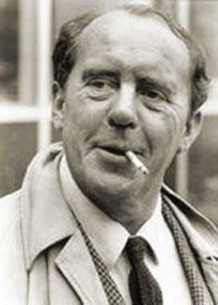| Heinrich Böll  AKA Heinrich Theodor Böll AKA Heinrich Theodor Böll
Born: 21-Dec-1917
Birthplace: Cologne, Germany
Died: 16-Jul-1985
Location of death: Bonn, Germany
Cause of death: unspecified
Remains: Buried, Bornheim-Merten Friedhof, Bonn, Germany
Gender: Male
Religion: Roman Catholic
Race or Ethnicity: White
Sexual orientation: Straight
Occupation: Novelist Nationality: Germany
Executive summary: The Train Was On Time Military service: German Army (1939-45, to Corporal) Heinrich Böll was raised in Germany between the World Wars, and said that he was repulsed by the rise of the Nazis. He stood firm against societal and peer pressure he never joined the Hitler Youth. Drafted into the German Army as a young man, he fought on the front lines in Poland, France, and Russia, and was shot four times and lost all his toes to frostbite. He was eventually captured and imprisoned by Allied forces. After the war he returned to half-destroyed Cologne, and lived in the ruins of his family home while working in his father's cabinet shop and, later, as a low-level city bureaucrat.
His first novel, The Train Was On Time was published in 1949, telling the story of a German soldier assigned to the Eastern front who knows in his heart that the train is taking him to his own death. He was probably best known beyond Germany for his novel Group Portrait with Lady, in which war-time informants tell investigators about an affair between a German woman and a Russian prisoner of war. He was hailed as a master of postwar Trümmerliteratur, the "literature of the rubble", telling tales of ordinary Germans in the aftermath of the Holocaust.
He was the President of International PEN, the writers' anti-censorship group, and Alexander Solzhenitsyn stayed at Böll's home after he was expelled from the Soviet Union. In 1972, when he was notified that he had won the Nobel Prize, his immediate response was "Really? I, and not Günter Grass?" Grass, another great postwar writer in divided Germany, won his Nobel Prize in 1999. Böll died in 1985, and left his papers, original manuscripts, and unpublished works to Cologne, city of his birth, where they were among the treasures destroyed in the 2009 collapse of the city's archives building. Father: Viktor Böll (cabinet maker)
Mother: Maria Hermanns Böll
Brother: Alois
Wife: Annemarie Cech Böll (b. 21-Dec-1917, m. 6-Mar-1942, until his death, four children)
Son: Christoph (b. 1945, d. infancy)
Son: Raimund (b. 1947)
Son: René (b. 1948)
Son: Vincent (b. 1950)
High School: Kaiser-Wilhelm Gymnasium, Cologne, Germany (1937)
University: University of Cologne (briefly, 1937)
Georg Büchner Prize 1967
Nobel Prize for Literature 1972
International PEN Past President
Shot four times, WWII
Taken Prisoner of War 1945
English Ancestry (paternal)
German Ancestry
Author of books:
Der Zug war Pünktlich (The Train Was On Time) (1949, novel)
Das Vermächtnis (A Soldier's Legacy) (1948, novel)
Wanderer, Kommst du Nach Spa (Stranger, Bear Word to the Spartans) (1950, novel)
Wo Warst du Adam? (Adam, Where Art Thou?) (1951, novel)
Der Engel Schwieg (The Silent Angel) (1952, novel)
Und Sagte Kein Winziges Wort (Acquainted with the Night) (1953, novel)
Haus Ohne Hüter (The Unguarded House; a/k/a Tomorrow and Yesterday) (1954, novel)
Das Brot der Frühen Jahre (The Bread of Our Early Years) (1955, novel)
Irisches Tagebuch (Irish Journal) (1957, novel)
Die Spurlosen (Missing Persons) (1957, novel)
Dr. Murkes gesammeltes Schweigen (Dr. Murke's Collected Silence) (1958, novel)
Billard um Halb Zehn (Billiards at Half-Past Nine) (1959, novel)
Erzählungen, Hörspiele, Aufsätze (Stories, Political Writings, and Autobiographical Works) (1961, essays)
1947 bis 1951 (Children Are Civilians Too) (1963)
Ansichten eines Clowns (The Clown) (1963, novel)
Entfernung von der Truppe (Absent Without Leave) (1964, novel)
Ende einer Dienstfahrt (End of a Mission) (1966, novel)
Nicht nur zur Weihnachtszeit (Not Just for Christmas) (1966, novel)
18 Stories (1966, short stories)
Gruppenbild mit Dame (Group Portrait with Lady) (1971, novel)
Die verlorene Ehre der Katharina Blum (The Lost Honor of Katharina Blum) (1974, novel)
Fuersorgliche Belagerung (The Safety Net) (1979, novel)
Was Soll aus dem Jungen Bloss Werden? (What's to Become of the Boy?) (1981, memoir)
Die Verwundung (The Casualty) (1983, novel)
Frauen vor Flusslandschaft (Women in a River Landscape) (1985, posthumous)
Der Blasse Hund (The Mad Dog) (1995, short stories; posthumous)
Requires Flash 7+ and Javascript.
Do you know something we don't?
Submit a correction or make a comment about this profile
Copyright ©2019 Soylent Communications
|